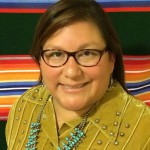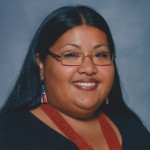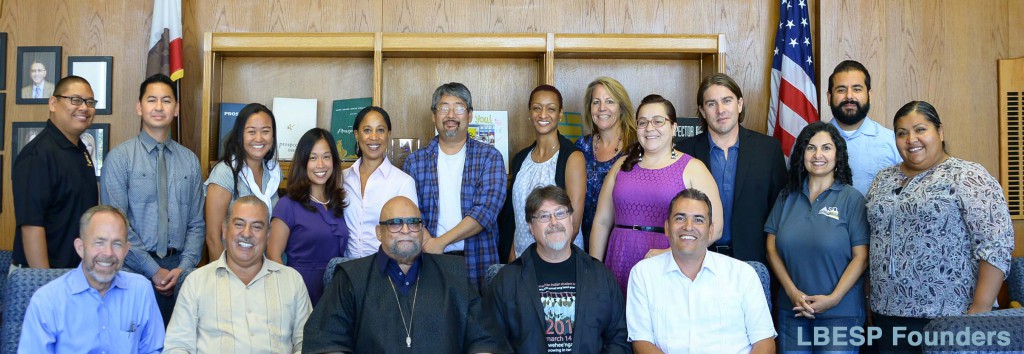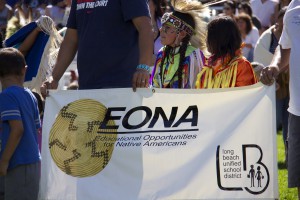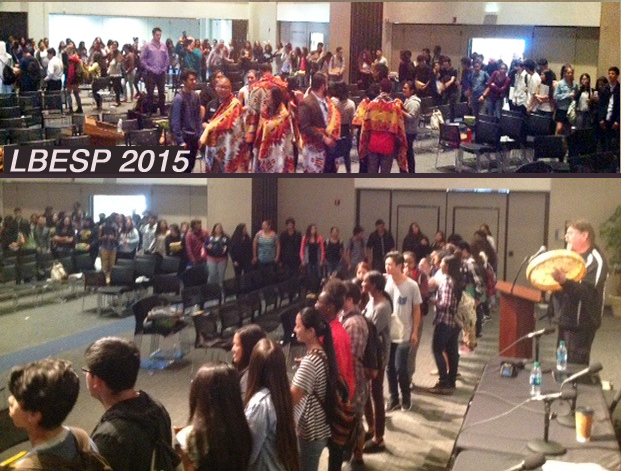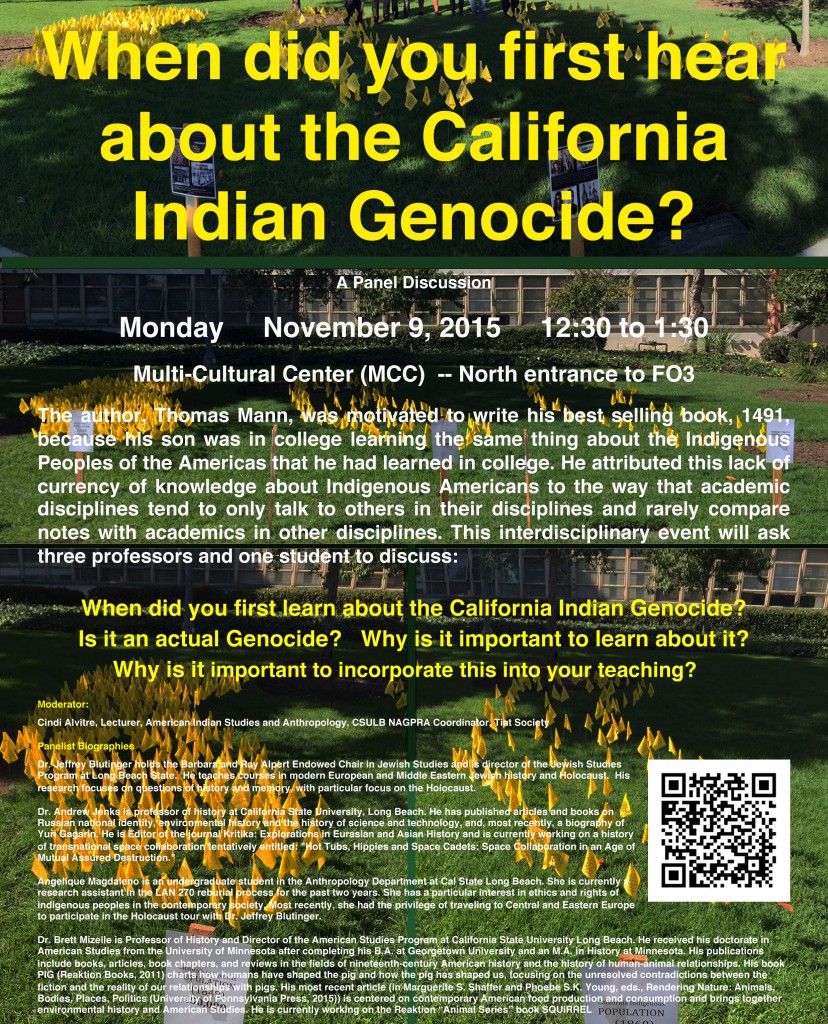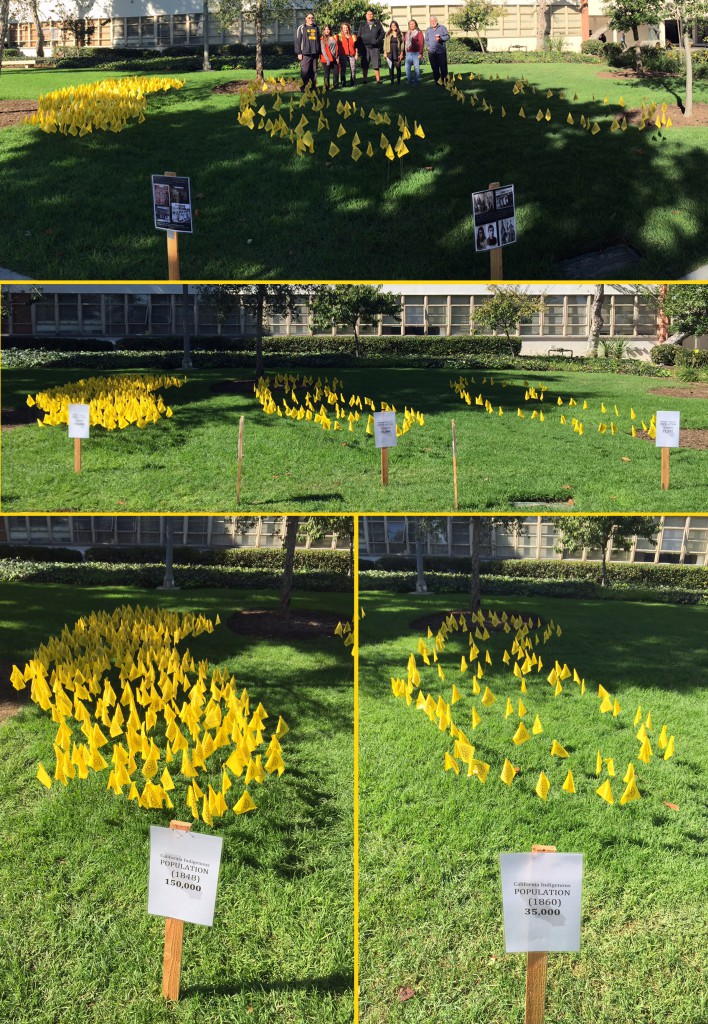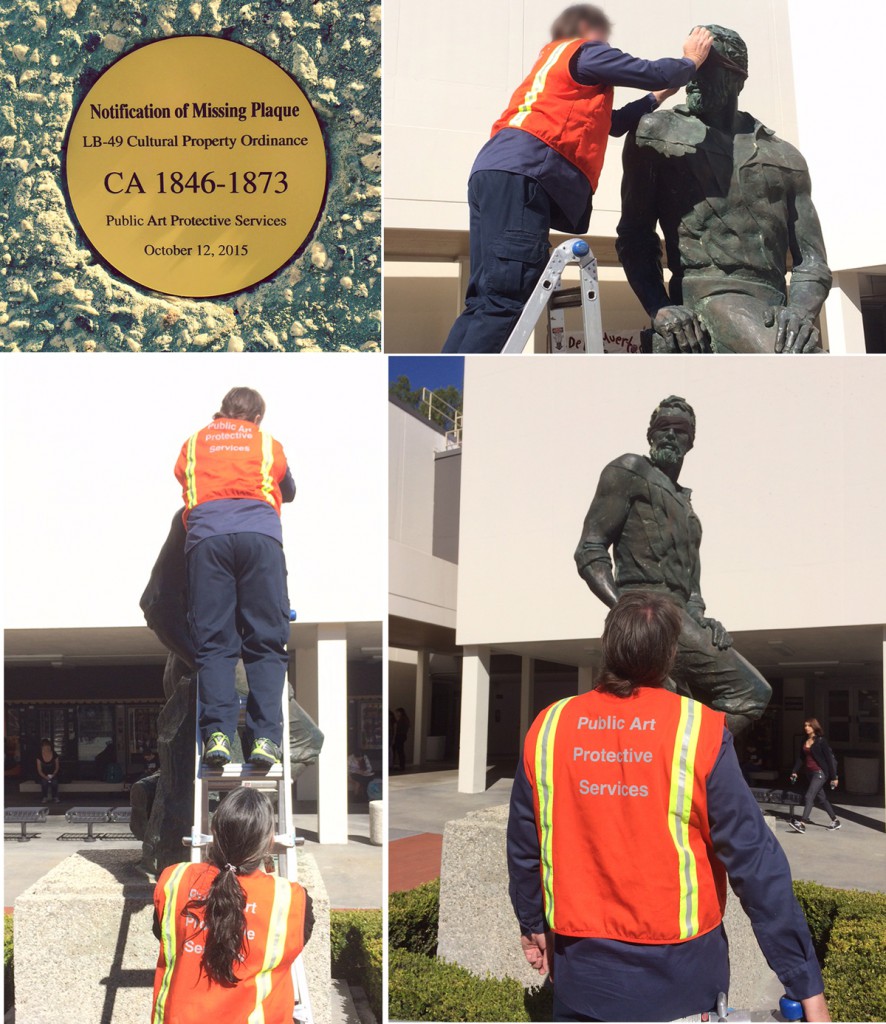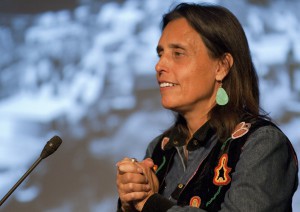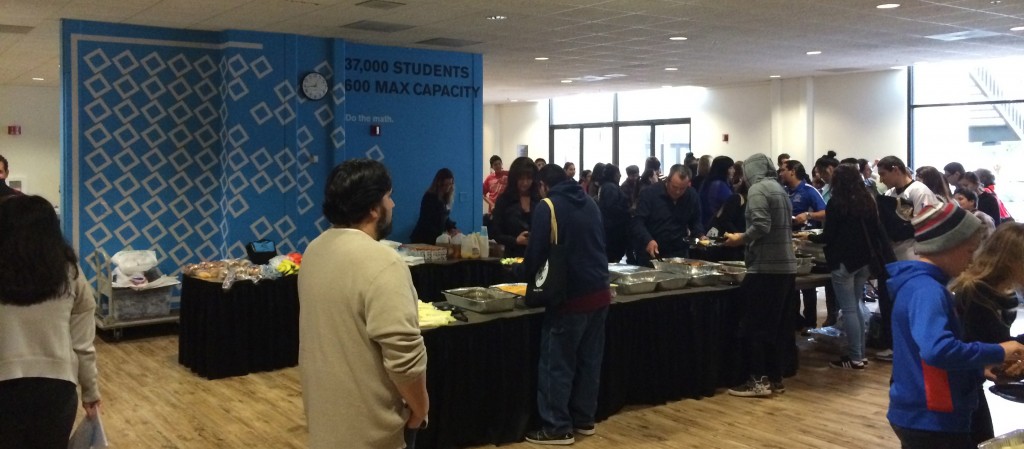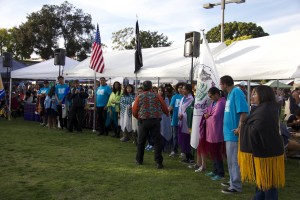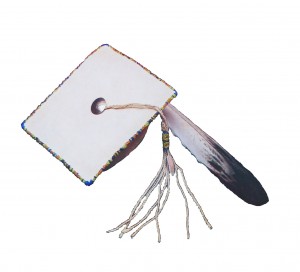46th Annual Pow Wow!
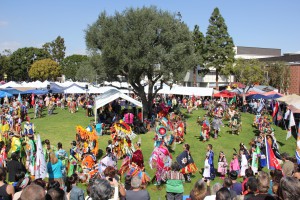 Thank you to all of you who joined us for the 46th Annual Pow Wow at Puvungna, March 12 & 13, 2016. The American Indian Studies Program congratulates the American Indian Student Council and our outstanding head staff that made this one of the best celebrations of life in recent memory.
Thank you to all of you who joined us for the 46th Annual Pow Wow at Puvungna, March 12 & 13, 2016. The American Indian Studies Program congratulates the American Indian Student Council and our outstanding head staff that made this one of the best celebrations of life in recent memory.
Here is a link to a few photos by Koichi Muto of our celebration. Pow Wow Photos 2016
If you missed the Pow Wow this year be sure to mark your calendars for the second weekend in March next year.
Our theme for last year’s celebration was “growing in two worlds” and refers to the ability of achieving balance in life. Special thanks to Pam Muro who translated the theme and has provided a link on how to say this in Tongva, “Growing in two Worlds” .
Poster from 2015 Pow Wow
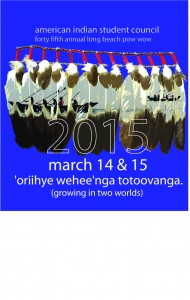
American Indian Studies in LBUSD
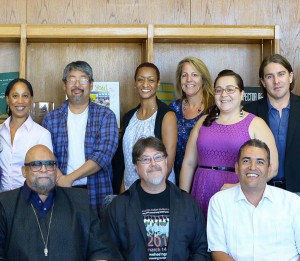 LBESI Long Beach Ethnic Studies Initiative (formerly LBESP)
LBESI Long Beach Ethnic Studies Initiative (formerly LBESP)
The Long Beach Ethnic Studies Initiative is a new and unique collaboration between the Long Beach Unified School District, LBUSD, and the four CSULB Ethnic Studies Departments, Africana Studies, American Indian Studies, Asian American Studies and Chicano/Latino Studies, in the College of Liberal Arts, CLA, and the College of Continuing and Professional Education, CCPE, at CSULB.
In the Fall 2015 Semester over four-hundred LBUSD High School students enrolled in twelve sections of the course US Diversity and the Ethnic Experience at six LBUSD high schools. Three courses were taught from an American Indian perspective by CSULB American Indian Studies faculty, Becky Sanchez and Anna Nazarian-Peters (pictured below). The interest in these courses became evident when close to one-thousand five-hundred parents and students attended the orientations at the High Schools and seven hundred and seventy-one students registered for the four hundred and twenty available seats. In the Spring of 2016 American Indian Studies is teaching three sections of AIS 215 and one section of AIS 101 for LBUSD.
Link to LBUSD Ethnic Studies Website
We welcome Larry Hashima’s leadership as the LBESP Academic Coordinator and LBUSD EONA Program Director, Kathy Leonard, who will be the first to teach AIS 101 in the LB-ESP Program (pictured below).
Rebecca Sanchez Anna Nazarian-Peters Kathy Leonard
Link to New York Times Article
Link to Joseph Morales Huffington Post Article about Ethnic Studies AB 101 Bill
Link to Education Week article by Joseph Morales
Link to Long Beach Press-Telegram Article about LBESP
“Our goal is to develop a national Ethnic Studies Model that other school districts and universities can replicate throughout California and the US”.
Faculty Honored at LBESP Conference on Ethnic Studies
On October 31st of 2015, the LBESP Project held a Conference at CSULB with almost four-hundred people in attendance. The highlight of the conference was a Keynote Address by Dr. Ken Montero, the Dean of the only Ethnic Studies College in the United States. All ten of the faculty teaching in the LBESP Program were honored for their dedication to making this idea a reality when each faculty member was given a Pendleton from one of the LB-ESP students. Sponsored by the Ethnic Studies Department Chairs, an honoring song was sung for the LBESP faculty that served as the formal ending of the conference. American Indian Studies wishes to express our gratitude to the LB-ESP Faculty for their role in implementing this new and important partnership with the LBUSD and CSULB.
Excerpt from DAILY 49er Article: LBUSD students enroll in ethnic studies
November 2, 2015
“A small group of teachers stood in a circle in the University Student Union Ballroom as nearly 300 high school students danced to the pounding of a Native American drum to show appreciation for their instructors’ work.
This was the conclusion to the first Ethnic Studies Conference at California State University, Long Beach on Saturday. The conference brought Long Beach Unified students from six high schools together for a day of workshops, panels and guest speakers.
The Long Beach Ethnic Studies Program debuted this fall to give high school students the opportunity to earn college credit with a weekend ethnic studies class taught on Long Beach high school campuses….”
About the LBESI Long Beach Ethnic Studies Initiative
The Long Beach Ethic Studies Initiative (formerly the Long Beach Ethnic Studies Program) is a collaboration with Long Beach Unified School District, CSULB Africana Studies Department, CSULB American Indian Studies Program, CSULB Asian and Asian American Studies Department, CSULB Chicano/Latina Studies Department, the College of Liberal Arts and the CSULB College of Continuing and Professional Education. The LBESI Project is not affiliated with any organizations or programs that are not listed above.
Honoring Students & Supporters of American Indian Studies
Honoring Students & Supporters of American Indian Studies
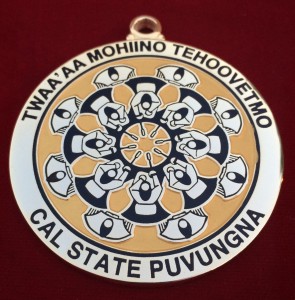 We have recently created the medallion pictured to the left to honor our outstanding AIS students, staff, faculty, alumni and supporters. This idea grew out of a generous donation by Mabelle and John Hueston in honor of CSULB American Indian Studies faculty who have passed on. These medallions have been created with the help of Art Neri, Dr. Jeffery Klaus, Christopher Ramirez and Craig Torres. A few of our outstanding AIS students, staff, faculty and supporters were recently awarded these medallions for their support of American Indian Studies and American Indian Students at Cal State Puvungna. The wording on the Medallion is in the Tongva language and means; count or measure what you value.
We have recently created the medallion pictured to the left to honor our outstanding AIS students, staff, faculty, alumni and supporters. This idea grew out of a generous donation by Mabelle and John Hueston in honor of CSULB American Indian Studies faculty who have passed on. These medallions have been created with the help of Art Neri, Dr. Jeffery Klaus, Christopher Ramirez and Craig Torres. A few of our outstanding AIS students, staff, faculty and supporters were recently awarded these medallions for their support of American Indian Studies and American Indian Students at Cal State Puvungna. The wording on the Medallion is in the Tongva language and means; count or measure what you value.
You can support American Indian Studies with a tax-deductible donation by clicking Link to Give.
When did you first hear about the California Indian Genocide?
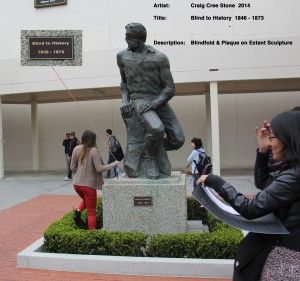 Panel Discussion: November 9th in the Multi-Cultural Center (MCC) 12:30 – 1:30
Panel Discussion: November 9th in the Multi-Cultural Center (MCC) 12:30 – 1:30
The author, Thomas Mann, was motivated to write his best selling book, 1491, because his son was in college learning the same thing about the Indigenous Peoples of the Americas that he had learned in college. He attributed this lack of currency of knowledge about Indigenous Americans to the way that academic disciplines tend to only talk to others in their disciplines and rarely compare notes with academics in other disciplines. This panel discussion will ask three professors and one student from different disciplines outside of American Indian Studies to discuss: When did you first learn about the California Indian Genocide? Is it an actual Genocide? Why is it important to learn about it? And, why is it important to incorporate this into your teaching?
Recently the high school AP (Advanced Placement) Exam for American History in the United States was revised and has been characterized by American Indian Studies Scholars and Historians as “perpetuating lies about American Indian Peoples”.
Link to article about new AP History Exam
Earlier this semester an American Indian Student at CSU Sacramento was told by her History Professor that she was expelled from his course for questioning his refusal to use the term Genocide to refer to the lived experience of American Indians. While she was not dropped and continues to take his course, the question still lingers.
Link to Article about History Professor in Indian Country Today Link to Article about History Professor on Fox News
Recently, California became the first state to ban the use of a name for school mascots that denigrates American Indian People, when Governor Brown recently signed Assembly Bill 30.
Link to article about AB 30 in Think Progress Link to article about AB 30 in ABC News.
The CSULB American Indian Studies Program is interdisciplinary in nature and currently has partnerships with eighteen departments and programs across several colleges. AIS is pleased to initiate this campus dialogue in partnership with the MCC (Multicultural Center), Jewish Studies, American Studies, History, the American Indian Student Council and the American Indian Science and Engineering Society Student Chapter about a subject that is seldom taught in the United States yet essential, not only to our understanding of the history of California, but more specifically, to understanding the implications of having “Prospector Pete” as our School Mascot.
Link to 2014 Press Telegram article about rebranding CSULB and retiring Prospector Pete
AISC Events Leading up to the Panel Discussion:
Leading up to the panel discussion the American Indian Student Council, AISES and the American Indian Studies Program will sponsor several events to raise awareness about this issue. The first project is Craig Stone’s “Blind to History” project that places a blindfold on the “Prospector Pete” statue that is locate between F02 where the History Department is located and the FO3 where the American Indian Studies Program, the Chicano and Latino Studies Department and the Asian and Asian American Studies Department are located. The statue is located in such a way that he is looking toward the History Department while turning his back to the Ethnic Studies Departments. This project was installed on October 29th and continues through November 5th and was presented on the AIS webpage for a week prior to installing the artwork (see image above).
Link to 49er article “Blind to American Genocide” Link to Blind to History Youtube Video Link to Blind to History Flash Mob Round Dance
November 2nd – Nov 5th AISC/AIS California Indian Genocide Awareness Public Art Project
Located on the lawn in front of the History Department, each golden flag represents 300 California Indians and has a printed logo with the slogan in the Tongva Language, “Twaa’aa Mohino Tehoovetmo” meaning: Count What You Value. (image below)
AISC & AISES answered questions about the California Native American Genocide at a American Holocaust table
during the week that was locate at various locations in the plaza by the History Department. (Image Below)
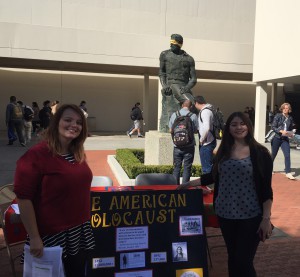
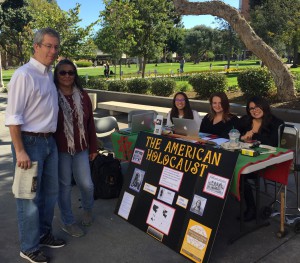
Initial “Blind to History” press coverage (image above) Images of unknown persons referred to above (image below)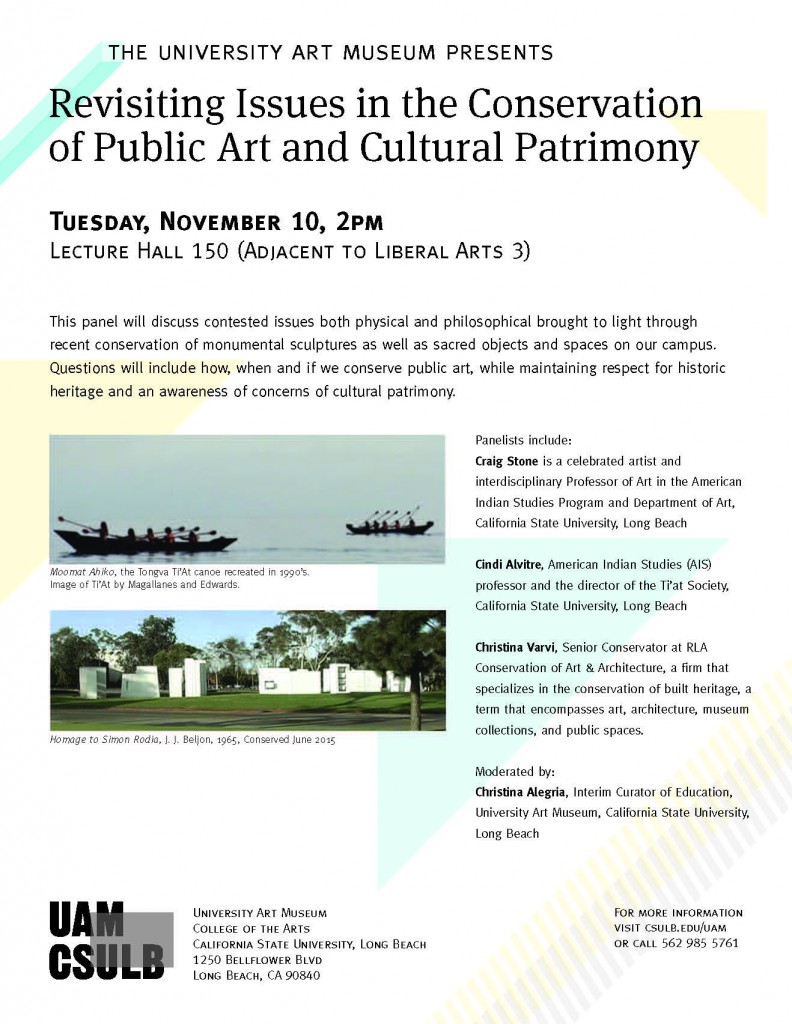
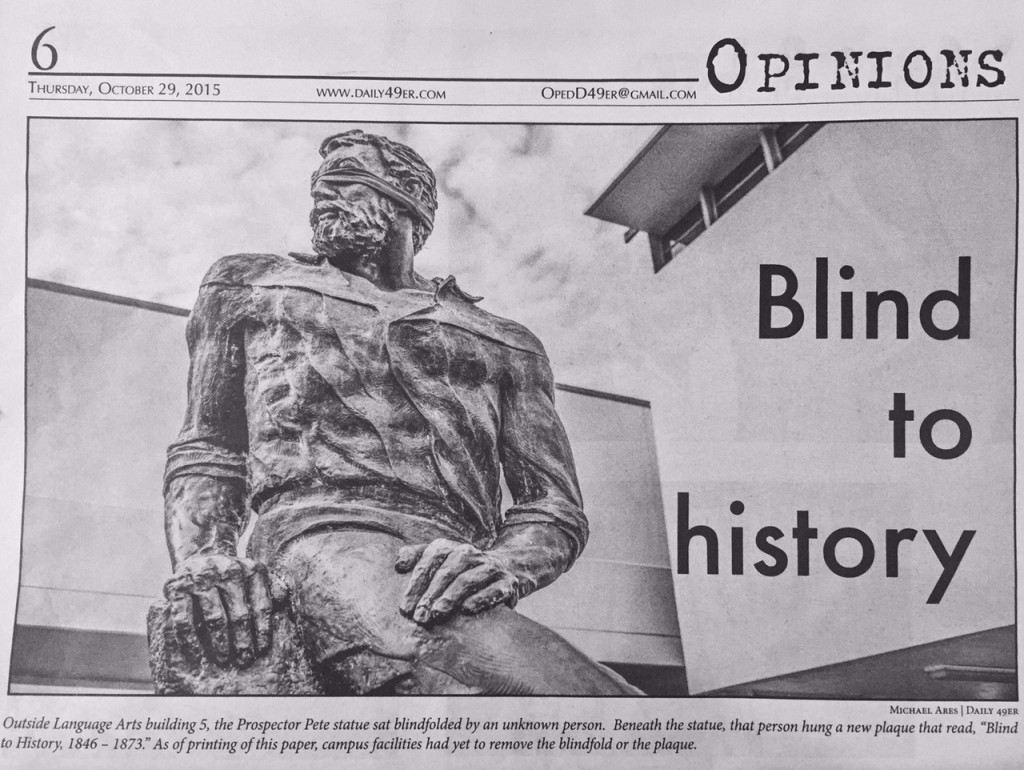
Winona LaDuke (Anishinaabe) Honor the Earth
Posted on April 27, 2015 by Erika Carter
The Department of Women’s, Gender and Sexuality Studies along with the American Indian Studies Program welcomed Winona LaDuke (Anishinaabe) to speak on campus Thursday, April 23rd. LaDuke is one of the nation’s leading voices on environmental issues, sustainable development, climate change and food security as well as Native American and women’s issues.
The presentation kicked-off with LaDuke sharing a video called, “Honor the Earth: Triple Crown of Pipeline Rides,” which highlighted the Anishinaabeg tribes’ ride against the proposed expansion of the Alberta Clipper pipeline in northern Minnesota, in September 2013. LaDuke is passionate about preserving the indigenous way of life that oil companies threaten to destroy.
“We were told by our ancestors that we have a choice,” LaDuke began, “between two paths—one of scorched earth and the other green. It is our choice right now which road we take for the years to come.” LaDuke is referring to the extreme methodsof oil extraction, such as oil fracking, that oil industries are utilizing for pure monetary gain.
LaDuke believes that there are three major problems at fault, which could eventually destroy our ecosystem if we don’t correct our behavior, and fast:
Climate Change is one such crucial factor. The number one causality of climate change is due to coal fire power plants, which emit massive amounts of CO2 into our atmosphere. According to greenpeace.org, “Governments across the world are allowing the industry to spend hundreds of billions of dollars to build hundreds of new coal-fired power stations worldwide in the coming years. If they are built, CO2 emissions from coal are expected to rise 60 percent by 2030.” We’re spiking the temperatures because of the increased amounts of CO2 in the atmosphere, and we need to keep global temperature rise below 2ºC, or the results will be devastating.
We could face an influx of natural disasters, such as widespread drought, flooding and massive population displacement caused by rising sea levels (greenpeace.org). Once this CO2 goes into the atmosphere, it travels into our oceans and the carbon dioxide acidifies our water. “Our oceans are literally on acid,” LaDuke said to a stunned audience. The majority of the world relies on the ocean as a food source and the increased acidity is contaminating our waters. Insurance companies predict that we’ll spend 20% of world GEP on climate-related disasters in next the 5 years. No city, no county, no tribal government, or federal government is preparing for the cost or implications of climate change.
The second major problem our ecosystem faces is the damaging effects of fossil fuels. “I’m a product of the fossil fuel era,” said LaDuke, “and I’ve had a pretty good time benefitting from it’s advantages, but it’s time to change.” We are massive consumers of fossil fuels and the system is set up to make users addicted to electricity, gasoline for cars, cell phones, etc., which becomes an endless cycle of consumption. LaDuke said, “We get stressed out if we don’t have access to these necessities. We feel entitled to them.” LaDuke points out that we are structurally set up to be highly-inefficient. We are wasting 57% of our power from the point of origin to the point of consumption, from power line to outlet. “We have become structurally dependent on energy companies who profit from our continued need to consume more energy, not less,” said LaDuke.
LaDuke uses the metaphor of “addicts” to describe societies’ behavior when it comes to energy consumption. “Our state and federal policy is entrenched with dealers in the form of oil and energy companies. These are the people who are writing our public policy.”
Oil fracking was the main extreme behavior on LaDuke’s agenda for the evening. Oil fracking is not a low-impact activity; it involves drilling horizontally and then vertically into the bottom of the ocean, pumping sand and a mystery solution comprised of 750 chemicals, and then exploding said mixture into the earth’s bedrock to extract oil and asphalt. The fracking industry is not required to disclose the 750 chemicals they utilize during this extreme process, and they are exempt from every major environmental law in the U.S., such as the Clean Air Act, Clean Water Act, and the Safe Drinking Water Act. “Oil fracking companies propose to take water out of the ocean, contaminate it, and then re-inject under the hopes that what goes down does not come up. That’s an iffy geological proposition after you’ve cracked the earth’s bedrock. That’s not a safe-bet.”
A few of LaDuke’s solutions to the myriad of problems we face include: reducing our carbon footprint at the local level, by investing in solar panels, which can save homeowners 25% of the energy costs;LaDuke also suggests growing our food locally and re-structuring our food economy, instead of relying on outsourced products. She uses the example of urban farmer, Will Allen, who grows a million pounds of food on the three acres of land in the heart of New York City. “If he can do it, we can do it,” said LaDuke. Awareness of the problems at the national level is crucial and we need to enact these proposed solutions. LaDuke states that you don’t have to protest, but you do have to get involved and let your government know that you’re not okay with what they’re doing.
LaDuke had this to say about the global-scale situation, “We face these issues as a result of the fossil fuels era—and while we’ve had a great time, we need to want a graceful exit. I don’t want to explode my way out. I don’t want to combust my way into oblivion or contaminate my entire ecosystem. We need to know when it’s time to bow-out and gracefully exit.”
Intertribal Education Collaborative (ITEC) College Exploration Day
Cal State Puvungna was honored to host the first Intertribal Education Collaborative (ITEC) College Exploration Day event on January 15, 2015 in the USU Ballrooms. The event was attended by over one-hundred American Indian youth (6th grade – 12th grade) to learn about the college admissions process. Colloborators included; Victor Valley Community College, University of California, Los Angeles, University of California, Irvine, University of California, Riverside, Cal Poly Pomona, University of Redlands, San Diego State University, and Pitzer College.
Thank you to all of the students who attended this event and the event organizers and speakers who contributed to the success of the first ITEC College Exploration Day at Puvungna.
Lunch was provided by the San Manuel Band of Mission Indians
Here is a partial list of thoses who contributed to this event:
| Fairuz Gladys Dakam – UCLA | ||
| Clementine Bordeaux – UCLA | ||
| Joshua Gonzales – UCRiverside | ||
| Cathy Knowles – San Manuel Indian Nation | ||
| Elizabeth Brierty – San Manuel Indian Nation | ||
| Gabe Pimentel – Sherman Indian High School | ||
| Cindi Alvitre – CSULB | ||
| Craig Stone – CSULB | ||
| Sandy Dixon – Cal Poly Pomoma | ||
| Bruce Vancil – CSULB | ||
| Harrelson Notah – CSULB | ||
| Pamela James – Victorville Community College | ||
| Nora Pulskamp – University of Redlands | ||
| Maria – University of Redlands | ||
| Scott Scoggins – Pitzer College | ||
| Lynda Estrella – Walking Shield | ||
| Dawn Valencia – Riverside Community College | ||
38th Annual AILOTT Conference
The campus community is invited to attend the keynote presentations during the American Indian Student Council’s Annual AILOTT Conference on Saturday, November 8, 2014 from 11:25 to 12:30 in the College of Business Administration CBA – 140. Michelle Rajehia is the author of Reservation Reelism: Redfacing, Visual Sovereignty, and Representations of Native Americans in Film (University of Nebraska Press, 2011), is a study of the shaping of the perception of Native Americans in Hollywood since the era of silent films.
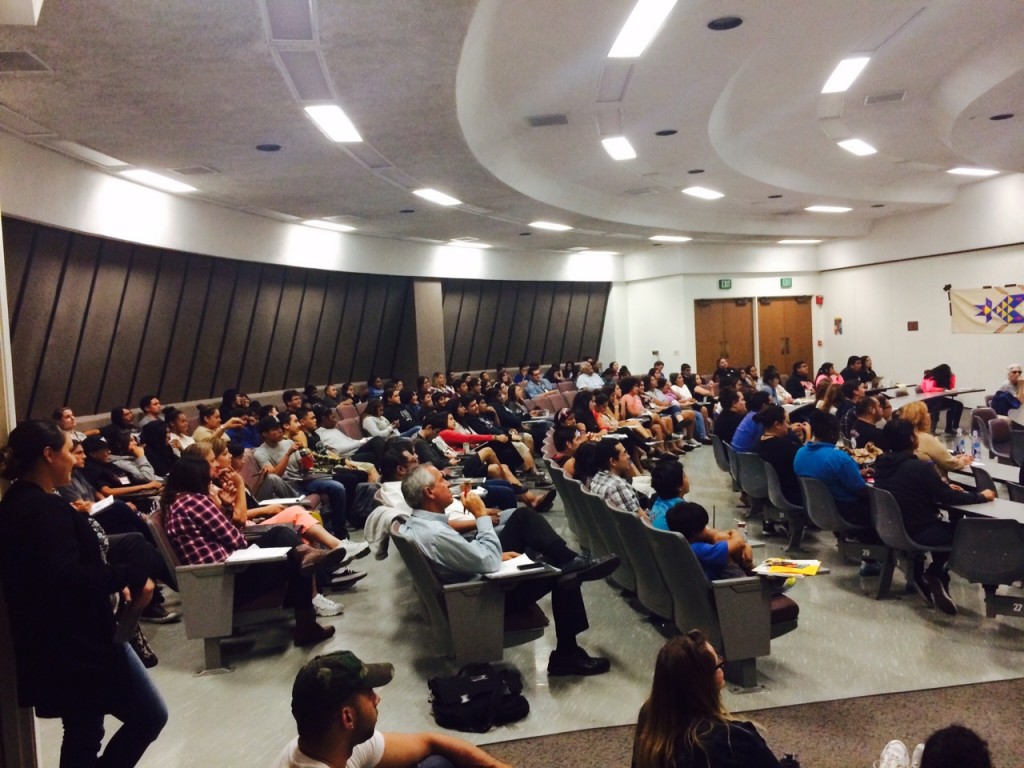
 Larry Smith is a producer, publicist and co-host of Pacifica’s and KPFK’s AMERICAN INDIAN AIRWAVES, the longest running Indigenous radio program in the country.
Mr. Smith is a lecturer in the Film and Electronic Arts Department and in the American Indian Studies Program at Cal State Long Beach / Puvungna and will speak about Racial Stereotypes in the Mass Media.
Larry Smith is a producer, publicist and co-host of Pacifica’s and KPFK’s AMERICAN INDIAN AIRWAVES, the longest running Indigenous radio program in the country.
Mr. Smith is a lecturer in the Film and Electronic Arts Department and in the American Indian Studies Program at Cal State Long Beach / Puvungna and will speak about Racial Stereotypes in the Mass Media.
“Decolonizing the Anti-Violence Movement” – A lecture by Dr. Andrea Smith
“Decolonizing the Anti-Violence Movement” – A lecture by Dr. Andrea Smith
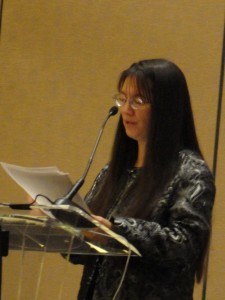 Dr. Andrea Smith is an Associate Professor of Media & Cultural Studies at UC Riverside. She is the author of two books – Native Americans and the Christian Right, and Conquest: Sexual Violence and American Indian Genocide. Dr. Smith is the editor of The Revolution Will Not Be Funded: Beyond the Nonprofit Industrial Complex, and co-editor of The Color of Violence, the Incite! Anthology. Dr. Smith currently serves as the US Coordinator for the Ecumenical Association of Third World Theologians, and she is also the co-founder of Incite! Women of Color Against Violence. Dr. Smith recently completed a report for the United Nations on Indigenous Peoples and Boarding Schools.
Dr. Andrea Smith is an Associate Professor of Media & Cultural Studies at UC Riverside. She is the author of two books – Native Americans and the Christian Right, and Conquest: Sexual Violence and American Indian Genocide. Dr. Smith is the editor of The Revolution Will Not Be Funded: Beyond the Nonprofit Industrial Complex, and co-editor of The Color of Violence, the Incite! Anthology. Dr. Smith currently serves as the US Coordinator for the Ecumenical Association of Third World Theologians, and she is also the co-founder of Incite! Women of Color Against Violence. Dr. Smith recently completed a report for the United Nations on Indigenous Peoples and Boarding Schools.
What: “Decolonizing the Anti-Violence Movement” – A lecture by Dr. Andrea Smith
Where: The Beach Auditorium, USU 1st Floor
When: Wednesday, Oct. 15th at 11am-12:45pm
This event is co-sponsored by Women’s, Gender, and Sexuality Studies, American Indian Studies, Sociology, MAPS and AISC.
44th Annual CSULB Pow Wow at Puvungna
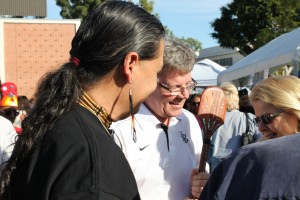
Artist Chris Diaz presented Interim President Don Para with a carved paddle on Saturday afternoon at the 44th annual Pow Wow. Chris was asked by the American Indian Community at CSULB to create an artwork to honor CSULB Interim President Don Para for his continued support of the American Indian Community at CSULB. Photo by John Shrader
Many thanks to our students, staff, faculty, administrators, alumni, organizations, volunteers and community members who made our Pow Wow Celebration such a success this past weekend. The Pow Wow 101 workshops were a great success and it was a pleasure to have so many American Indian Alumni return for our annual homecoming. Special thanks to John Dawson who has been the voice of our Pow Wow for many years and who has retired from his position as our Master of Ceremonies.
4th ANNUAL CSULB POW WOW AT PUVUNGNA * MARCH 9-10, 2013 DANCE CONTEST RESULTS & HEAD STAFF, etc…
Dance Category/Age 1st Place 2nd Place 3rd Place
Men’s Golden Age #2392-Barry Hamilton #2572-Allenroy Pay-Kwin #2380-Chuck Cadotte
(Age 55 & Up) (Cheyenne) (Jicarilla Apache & Zuni) (Lakota)
Women’s Golden Age #2590-Dr. Lita Matthews #2397-Arnita good face #2657-Carolyn Reyes
(Age 55 & Up) (Pueblo) (Lakota Sioux) (Ojibwe/Dakota)
Men’s No. Traditional #2605-MJ Bull Bear #2599-Nico Phoenix #2665-Pearson Tahuka
(Age 18 & Up) (Oglala) (Paiute/Tohono O’odham) (Waninio/Siminal)
Men’s So. Straight #2394-David Redbird #2370-David Patterson #2389-Silas Perkins
(Age 18 & Up) (Cheyenne) (Sac and Fox) (Comanche, Choctaw&Wichita)
Men’s Grass #2371-Shiigo Yellowhorse #2662-Tony Nelson #2621-Adam Loya
(Age 18 & Up) (Dine’) (Kumeyaay/Cree) (Gabrielino/Tongva)
Men’s Fancy #2571-Julian Phoenix #2613-Matthew Porter #2566-Dennison Brown
(Age 18 & Up) (Tohono O’odham & N. Paiute) (Cherokee) (San Carlos Apache)
Dance Category/Age 1st Place 2nd Place 3rd Place
Women’s No. Traditional #2658-Brittney Hunter #2632-Lupe Lopez #2620-Natalie Weeks O’Neal
(Age 18 & Up) (Hopi/Hualapai) (Otomi/P’urepecha) (Fort Peck Assiniboine)
Women’s So.Cloth&Buckskin #2700-Laurie Whitecloud #2591-J.W. Sheridan #2624-Sharyse Monroe
(Age 18 & Up) (Otoe/Digueno) (So. Cheyenne) (Hopi/Cherokee/Navajo)
Women’s Jingle Dress #2636-Pam James #2396-Genevieve Lemaster #2384-Monica Jacome
(Age 18 & Up) Santee, Sioux & Chicasaw) (Miwuk, Paiute, Choinumni) (Mesa Grande & Kumeyaay)
Women’s Fancy Shawl #2398-Star Whiteye #2625-Sandra Rivera #2627-Tytianna Harris
(Age 18 & Up) (Delaware/Ojibway) (Navajo) (Navajo Nation)
Dance Category/Age 1st Place 2nd Place 3rd Place
Teen Boy’s Traditional #2603-Myles Bull Bear #2583-Mchael Toro #2607-Chedo Miranda
(Ages 13-17) (Oglala/Dine’) (Shoshone/Blackfoot/P’urepecha) (Otoe, Osage, Juaneno)
Teen Boy’s Grass #2388-Jake Jacome Only 1 Contestant
(Ages 13-17) (Kumeyaay, Mesa Grande)
Teen Boy’s Fancy #2633-Ba’ac Garcia Only 1 Contestant
(Ages 13-17) (Tohono O’odham)
Teen Girl’s Traditional #2580-Larissa Bohay #2604-Lalani Bull Bear #2637-Shaelynn Whiteshield
(Ages 13-17) (Kiowa/Paiute) (Lakota & Dine’) (So. Cheyenne)
Teen Girl’s Jingle Dress #2593-Corena Leone #2653-Rebecca Pullskamp #2634-Nanabah Keediniihii
(Ages 13-17) (Lakota, Dakota, Oglala) (Navajo/Serrano/Cahuilla) (Dineh)
Teen Girl’s Fancy Shawl #2564-Weliyah Baga #2640-Lea White Plume Ortiz #2576-Onaya Rubio
(Ages 13-17) (Shoshone/Tule) (Navajo/Apache/Southern Ute) (Yokut)
Junior Boys-All Categories #2364-Samuel Sierra #2595-Jonathan Henry #2635-Asencio Garcia
(Ages 7-12) (Ysleta Pueblo) (Navajo) (Tohono O’odham)
Junior Girls-All Categories #2592-Olivia Joyce Sheridan #2654-Alana Pullskamp #2618-Selena Ironcloud
(Ages 7-12) (So. Cheyenne/Omaha) (Navajo/Serrano/Cahuilla) (Ogala Lakota)
44th ANNUAL CSULB POW WOW AT PUVUNGNA * MARCH 8-9, 2014 DANCE CONTEST RESULTS
Tiny Tots Registered (Tiny Tots = ALL WINNERS!)
Name Tribe(s) Name Tribe(s)
Marquee Bull Bear (Oglala Lakota & Dine’) Woniya Sandoval (Dakota/Navajo)
Wanbli Bull Bear (Oglala / Dine’) Denell Tsosie (Paiute, Navajo, Kumeyaay)
Taloa Felihkatubbee (Navajo/Choctaw) Julea Van Hook (Ho Chunk)
Robbi Gonzales (Tejon Indian Tribe) Dakotah Alto (Paiute, Kumeyaay)
Emma Henry (Ojibwe) Devon Apache (Oglala Sioux, Dine’,Banock)
Hazel Ironcloud (Olgala Lakota) Benton Covarrubias (Jicarilla)
Alani Renee Johnson (Navajo) Kenny Gonzales (Tejon Indian Tribe)
Eva Koassechony (Comanche/Pawnee) Jordan Phoenix (T.O., N. Paiute, Navajo)
Angelina Loya (Gabrielino/Tongva) Marquette L. Sheridan (So. Cheyenne/Omaha)
Makayla Martinez (Oglala, Dine, Banock,Yaqui) Jason Vela (Juaneno/Tongva)
Shyann Monroe (Navajo/Hopi/Cherokee) Koda A. Whiteshield (So. Cheyenne/Navajo)
Lillian O’Neal (Fort Peck Assiniboine) Victor Whiteshield (So. Cheyenne)
Jace Phoenix (T.O., N. Paiute, Navajo)
HEAD STAFF * 43rd ANNUAL CSULB POW WOW AT PUVUNGNA * MARCH 9-10, 2013
Gourd Session (Sat/Sun):Golden State Gourd Society
Head Southern Singer: Steve Bohay (Kiowa)
Host Northern Drum: Bearspring Singers (Southern California)
Head Man Dancer: Nathan Chasing Horse (Lakota-Rosebud, SD)
Head Woman Dancer: Shandiin Yellowhorse (Navajo-San Pedro, CA)
Master of Ceremonies: John Dawson (San Carlos Apache)
Co-Master of Ceremonies Bobby WhiteBird (Southern Cheyenne)
Arena Director: Victor Chavez (Dine’)
Spoon Keeper: Patricia Lopez (Taos Pueblo)
PA Art Neri (P’urepecha)
Tiat Society California Presentation Saturday Eve-Dinner Break
VISITING DRUMS: DAY(S) – SESSIONS (1-3) FROM WHERE? SESSIONS:
#3-Wildhorse Singers (Sat. & Sun. – Session 1-3) (Los Angeles, CA) Saturday, March 8, 2014
#4-Blue Star (Sat. & Sun. – Session 1-3) (Orange County, CA) Session 1 – Sat. Afternoon
#5-Kalifornia Rambler’s (Sat. & Sun. – Session 1-3) (San Diego, CA) Session 2 – Sat. Evening
#6-Changing Spirits (Sat. & Sun. – Session 1-3) (Long Beach, CA) Sunday, March 9, 2014
#7-HorseThief (Sun. – Session 3 only) (San Juan) Session 3 – Sun. Afternoon
HEAD JUDGES — DANCE CONTESTS
Angela Campos Session 1: Saturday Aft. March 8, 2014
Genevieve Lemaster Session 2: Saturday Eve March 8, 2014
Mike Aviles Session 3: Sunday Aft. March 9, 2014
44th Annual CSULB Pow Wow at Puvungna 2014 Execute Pow Wow Committee:
Adelia Arredondo, Veronica Begay, Yue Begay, Wayne Belone, Taylor Brooks, Leeza Guardado, Marixa Hernandez, Vincent Holguin, Terrance Honanie, Jessica Jimenez, Lexie Martinez, Sarah Moreno, Anna Nazarian-Peters (American Indian Student Services Advisor), Melissa Nazzal, Josh Pinon, Roscoe Reed (President American Indian Student Council), Roscoe Reed & Amanda Passi (2014 Pow Wow Chairs), Larry Smith (Media Contact) Laura Stone, Craig Stone (Faculty Advisor), Marleena Higgins Thomas, “T.J.” Reed & Marcel Young
Sponsored by: Associated Students Inc., American Indian Student Council,
American Indian Studies Program, American Indian Student Services,
Engineering Society, College of Liberal Arts, College of the Arts, Division of
Student Services, and Student Life and Development
New Minor in Native American Cultures!
New Minor in Native American Cultures!
The American Indian Studies Program has established an ongoing partnership with Anthropology and other Departments to offer a revised 18 unit minor in Native American Cultures for students in majors leading to professions that impact the lives of American Indian People. Soon students will be able to earn a minor in AIS and graduate on time. Museum Studies/Cultural Resource Management, Anthropology, Social Work, Art History and Film are the first areas to be developed with the new minor that will begin in the Fall of 2014. Students currently taking the AIS Minor in American Indian Studies who are interested in the new option for the AIS Minor in Native American Cultures are encouraged to meet with the Director of the AIS Program, Craig Stone. New AIS Minor
Minor in Native American Cultures
Minor 18 units (Begins in the Fall 2014 Semester)
Lower Division Required (3 units)
AIS 101 Introduction to AIS
Co-requisite/Prerequisite: Any Foundation Course
Upper Division Core
Select 6 – 9 units from the following:
AIS 300 American Indians in Cinema (3) or AIS/FEA 450 American Indian and Indigenous Cinema (3)
AIS 320 (3) or AIS 420 American Indian Traditional Material Culture (3)
AIS/ENGL 340 American Indian Literature (3)
AIS 335 American Indian Philosophies (3) or AIS 336 Indigenous Philosophies of Sustainability (3)
AIS 485 American Indians and the Law (3)
AIS 490 Special Topics or 499 (3)
Students are encouraged to gain training in the following areas: Museum Studies/CRM, American Indian Studies, Anthropology, Art/Art History or Social Work.
Electives
Select: 6 – 9 units in any combination from the following courses and/or areas. Anthropology, Museum Studies/CRM, American Indian Studies, Art/Art History and Social Work.
Anthropology:
ANTH 321, ANTH 322, ANTH 329, ANTH 448, ANTH 449, ANTH 450 (maximum 3 units approved by advisor), ANTH 451 (can only be taken once) ANTH 487
Museum Studies/CRM:
AIS 222, AH 430, AH 431, ANTH 487
American Indian Studies:
AIS 105, AIS 106, AIS 215 or AIS 319, AIS 308, AIS/WGSS 313, AIS 400
Art/Art History:
AH 114, AH 430, AH 431, ART 440/540, ART 456/556
Social Work:
SW 220, SW 221,SW 330, SW 331, SW 350, SW 351
Note: SW 221 is only open to social work majors
Certificate in American Indian Studies
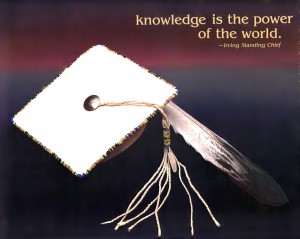 Students pursuing any approved degree or credential program of the University may at the same time earn a Certificate in American Indian Studies. Courses taken to meet the requirements may be used, where applicable, to meet General Education requirements or the degree or credential requirements of cooperating departments. Certification of successful completion of requirements will be issued upon the recommendation of the American Indian Studies Program Director.
Students pursuing any approved degree or credential program of the University may at the same time earn a Certificate in American Indian Studies. Courses taken to meet the requirements may be used, where applicable, to meet General Education requirements or the degree or credential requirements of cooperating departments. Certification of successful completion of requirements will be issued upon the recommendation of the American Indian Studies Program Director.
Requirements
- 1. A Bachelor’s degree with a major in a traditional discipline. (Certificate requirements may be completed prior to the completion of B.A. requirement).
- 2. Submission of all college/university transcripts to the academic advising coordinator, who will work with the student to develop a well‑integrated program of studies. Interested students are strongly encouraged to meet with the academic advising coordinator after having completed the lower division core courses.
- 3. A minimum of 24 units, distributed as follows.
Core Courses
Lower Division Core:
Take 9 units from the following courses: AIS 101, 105, 106, 200, 215, 222.
Upper Division Core:
Take 15 units from the following courses: AIS 300, 308, 319, 320, 335, 340, 400, 420, 485, 490, 497, 499.

